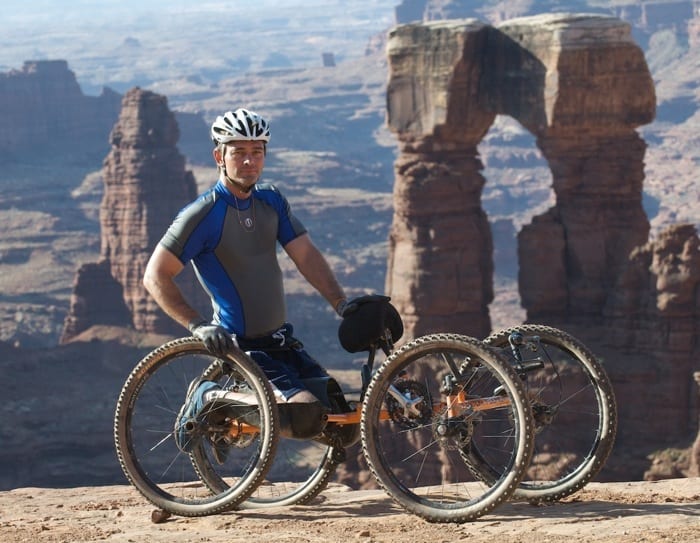 Last week I was honored to be able to spend each day traveling to different schools with Chris Waddell as he presents his Nametags program. Chris, a good friend from Middlebury College, started doing Nametags three years ago when he launched his foundation, One-Revolution.
Last week I was honored to be able to spend each day traveling to different schools with Chris Waddell as he presents his Nametags program. Chris, a good friend from Middlebury College, started doing Nametags three years ago when he launched his foundation, One-Revolution.
Twenty-three years ago, Chris had a ski accident that left him paralyzed. He went on to become the most decorated male monoskier in history, and one of the few athletes to medal in both summer and winter games. In 2009, he also became the first paraplegic to summit Mt. Kilimanjaro almost completely unassisted. Through his Nametags program, Chris shares life lessons that he has learned along the journey.
The Gift of Adversity
In the program, Chris shares a quotation by Lou Holtz: “Show me a successful person and I will show you a person that has faced adversity.” So often as parents, we want to shelter our children – from challenge, from pain, from hard work. We want it to be easy. The problem? That hard work is what let’s us experience the feeling of accomplishment. It is through challenge that we learn what we are made of–that we learn to be the best that we can be.
Throughout Nametags, Chris leads students in a chant of the mantra: “It’s not what happens to you; it’s what you do with what happens to you.” Everyone faces challenges, big and small, throughout their lives. However, we can all make choices about what we do with those challenges: do we see the tragedy or do we see the opportunity? Chris tells the story of a little girl who, when she realizes that he will never walk again, rides off on her bike as she comments, “That’s too bad.” That little girl saw the tragedy, but she didn’t see the potential gift: the gift of becoming a world champion.
The Benefit of Risk
One of Chris’ greatest challenges was climbing Mt. Killimanjaro, not just because of the technical difficulty, but because he knew that he was putting himself in a vulnerable position–risking public failure. Why did he do it? According to Chris, “the greatest risk that we run in life is taking no risk at all.” If we spend all of our time trying to fit in, trying not to be the one that stands out, we may never learn about that thing that makes us great. I love Chris’ definition of risk: being willing to feel uncomfortable.
Humans can be so fragile. We are so worried all of the time about being accepted, that sometimes we can miss who we are. The “safe” road is not always (or even usually) that one that leads us to happiness. Just like facing adversity, willingness to take a risk pushes us to go beyond our comfort zone.
Nobody Climbs a Mountain Alone
So often in life, our goal is independence. Individual achievement measures success. When Chris climbed Mt. Killimanjaro, aiming to be the first paraplegic to summit under his own power, he learned a difficult, but critical lesson–nobody climbs a mountain alone.
We need to help kids understand that they have multiple support structures, including family, friends, teachers,administrators, and coaches. They also need to learn how to access these support structures because asking for help does not come naturally. Interestingly, in his book about building resilience, Kenneth Ginsburg points out that one benefit of having kids participate in community service is that they learn that it is okay to accept help.
Small Choices Count
Chris’s foundation, One Revolution, was named for one revolution of the crank on his hand cycle. They estimated that it took 528,000 revolutions to make it to the top of Killimanjaro. Each of those revolutions was a choice–a choice to keep on going.
Everyday, we all make numerous choices, usually starting with whether or not to get out of bed. Each choice that we make determines who we will become. Great athletes become great through the discipline to perform the basics correctly. Great friends become great by making choices to stick up for their friends. It is through the small decisions that we make each day that we are able to choose the way that others see us–our “Nametags.”
The Lessons are Universal
The power of the Nametags program lies in the universal quality of the messages that Chris sends. The presentation was designed as a template that could theoretically be given by almost anyone because the themes are so universal.
Chris is a powerful presenter. He has great charisma and a wonderful rapport with his audience, whether it is a class of kindergarteners of a group of executives. He has given the Nametags presentation to over 100,000 students. I bet very few left untouched.
The challenge for the foundation now is to find others who can share the presentation, because its message is one that needs to reach every corner of the world. I am so grateful to have been given an opportunity to know Chris and be a part of such a powerful program.
Donna Volpitta, Ed.D. is a resilience educator. She is founder of URResilient, LLC (www.URresilient.com) and co-author of The Resilience Formula: A Guide to Proactive–Not Reactive–Parenting.





